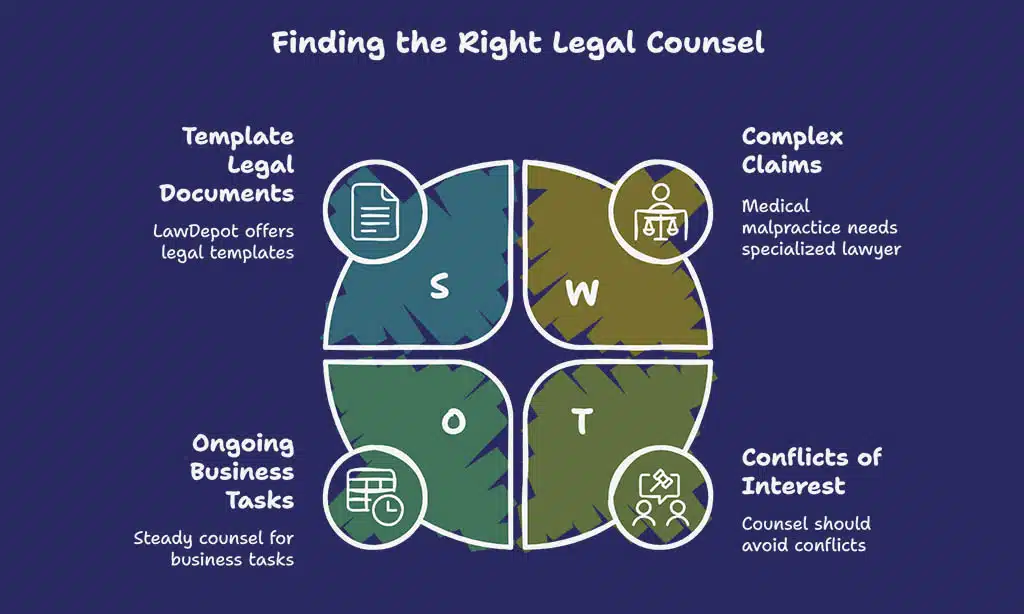You need legal help, but finding the right attorney can feel like picking a needle from a haystack. Your state bar association can connect you to a Certified lawyer referral service that vets licensed attorneys.
This guide shows how to check a license, weigh flat fees or hourly rates, and pick legal representation. Let’s get started.
Key Takeaways
- Pinpoint your legal need. You may need a family law, personal injury, contract, or criminal defense lawyer. Decide if you want a short‑term flat fee, an hourly or retainer agreement, or a contingency deal. Always confirm the lawyer holds a valid state bar license.
- Use a lawyer referral service. Visit the ARDC at One Prudential Plaza, 130 East Randolph, Suite 1500, Chicago, Illinois 60601 or go to www.iardc.org. You can also try the ABA site, Legal Assistance Foundation of Metropolitan Chicago, Land of Lincoln Legal Assistance Foundation, or Prairie State Legal Services.
- Verify expertise and record. Ask if they handled cases like yours and what the outcomes were. Read client reviews on legal portals. Check the ISBA member mark and state bar complaint records. (The ISBA referral guide updated September 6, 2023.)
- Test communication and fit. Send an email or call to see if they reply in two days. Ask about their case‑management portal, call line, or calendar tool. A good lawyer gives clear updates and itemized bills.
- Clarify fees in writing. Request a fee chart for hourly rates, flat fees, retainer draws, or contingency terms. Confirm whether costs cover court filing, mailing, or travel. Use a fee calculator or simple billing sheet to avoid surprise invoices.
Determine Your Legal Needs
Pinpoint your main legal problem—a contract dispute, divorce papers, or a child support claim, so you match the right family law or personal injury counsel. Decide if you need a quick prepaid legal plan or a long haul counsel who works on retainer fee or hourly rate.
Identify the area of law related to your case
Your case may fall in family law, personal injury or contract disputes. Or you may need criminal defense with a public defender. A general practice lawyer can handle simple issues.
LawDepot offers templates for forms, affidavits or agreements. You fill those legal documents yourself.
Complex claims like medical malpractice call for a specialized lawyer. They draft strong demand letters or fight in court. You find counsel with matching expertise. Seek legal services that match your needs.
Decide if you need a short-term or long-term attorney
Evaluate your legal problem timeline first. A property dispute or uncontested divorce can end in weeks, while a child custody battle may last months. You pay an hourly rate for each hour of work or agree to a contingency fee tied to the final judgment.
A retainer fee can secure legal representation at the start. The attorney must hold a state bar license and avoid unauthorized practice of law. Good counsel will review legal documents fast.
Ongoing business tasks need steady counsel. A small office might save money with flat rate plans, while big firms offer deep resources and staff. They handle large filings, conduct legal aid for corporations, and guide you on continuing legal education requirements.
A solo practitioner may know your company well and guide you step by step. All counsel should be admitted to practice law and free of conflicts of interest.
Research Potential Lawyers
Call a local lawyer referral service or check the American Bar Association site for tips. Try a lawyer directory or a legal database, then read client testimonials to spot the right match.
Seek recommendations from trusted sources
A neighbor solved a legal problem in housing by hiring a lawyer a friend praised. She described speedy legal representation and clear legal documents. An old college buddy helped me with a tricky family law matter.
That tip cut out the guesswork and eased the lawyer-client relationship.
Illinois groups such as Legal Assistance Foundation of Metropolitan Chicago offer vetted contacts. Land of Lincoln Legal Assistance Foundation breaks down legal fees and retainer fee details.
Prairie State Legal Services steers veterans through family law or housing fights out of court. Public defenders and notary publics can join your team at no upfront cost.
Use local lawyer referral services
Many towns run referral panels via state bar association websites. You find lawyers licensed to practice law in family law. You see options for civil disputes or marriage cases. Listings note when each attorney passed the bar examination.
They also list court level, from trial work to supreme court appearances. ARDC offices sit at One Prudential Plaza, 130 East Randolph, Suite 1500, Chicago, Illinois 60601. Staff post records on www.iardc.org.
They dig into lawyer misconduct so you stay safe.
Referral services link you to legal representation that fits your legal problem and budget. People compare retainer fee, hourly rate and contingent fee models. You check past work on editing legal documents and filing court papers.
This lets you size up ethical standing, communication style and the lawyer-client relationship before you sign a contract.
Evaluate Their Experience and Expertise
Check their wins in similar family law suits, and run their briefs through a legal research platform to see how they cite case law. Then scan a bar association directory for peer ratings and honor listings to spot true pros.
Check their experience with cases similar to yours
You need a lawyer who has handled cases like yours. Ask about file history and outcomes in similar family law disputes. During a consultation you can ask about case length, expected results, retainer fee, and hourly rate.
They must keep your data private, share regular updates, and show good judgment.
Clients gain clarity by reviewing sample legal documents. Try to see a court brief or contract template from past work, so you don’t chase your tail later. A strong lawyer-client relationship forms when both sides exchange clear information on strategy, fees, and timelines.
That proof of skill can steer you toward solid legal representation.
Assess their specialization within the specific legal field
Pick a lawyer who handles your type of case. A family law attorney drafts custody forms, property division papers and divorce petitions. A local Illinois State Bar Association member with the ISBA member mark shows they value integrity in the legal profession.
They speed up filings at your county courthouse, and cut through red tape.
Check if they focus on child support, alimony or adoption work. Ask how many similar cases they tried, and what tools, like case law databases or motion templates, they use to draft clear contracts.
That mix of expertise and resources shapes your lawyer‑client relationship. It helps you avoid costly surprises, be it retainer fee, hourly rate or extra court costs.
Review Professional Reputation
Read their record on a state bar site, like mining for clues. Scan client ratings on a law portal, and spot any warnings fast.
Look for client reviews and testimonials
Hundreds of past clients post feedback on lawyer pages. You can scan star ratings on a legal review site or peer-review directory. Some users describe how the retainer fee and hourly rate fit their budget.
Family law folks praise clear communication and a strong lawyer-client relationship.
State bar association websites list approved attorneys and share complaint records. The ISBA’s General Practice, Solo, and Small Firm Section published a referral guide in 2016 and updated it on September 6, 2023.
Real stories about case outcomes, legal documents, and verdicts reveal how legal representation works. Honest opinions help you pick someone who solves your legal problem ethically.
Verify their standing with state bar associations
Pursue the ARDC site, www.iardc.org, to look up lawyer records. The ARDC enforces rules and probes misconduct at One Prudential Plaza, 130 East Randolph, Suite 1500, Chicago, Illinois 60601.
It logs any ethics issues that could affect your legal representation or family law case.
Check the ISBA member mark to spot lawyers in good standing. Illinois State Bar Association promotes integrity in the legal profession and builds consumer confidence through that mark.
It confirms that a lawyer follows the rules for retainer fee terms and hourly rate and guards your lawyer-client relationship. This step prevents a legal problem with missing or flawed legal documents.
Assess Compatibility and Communication
Ask if they reply fast to e‑mails or video calls, so you feel heard, not ghosted. A solid lawyer‑client relationship grows from honest chat, shared calendars in case management software, and a friendly client portal.
Ensure their communication style aligns with your preferences
Fit legal representation to your chat mood. You may like quick texts or brief calls. Test if the lawyer uses the Attorney‑Client Bridge Program or an online portal. Send a note about your family law problem and see if they reply in two days or less.
Probe their email habit. Also, ask the retainer fee and hourly rate after the chat. This step shapes a strong lawyer‑client relationship.
Evaluate their availability for meetings and updates
Good lawyers share slots in their schedule tool, and they answer calls. You can ask if they open a time app to set meetings. They show how their legal representation fits into your routine, even if you face a family law case.
They give you a call line number and show you their inbox habits.
They update you by text alerts or case hub notes. You can ask if they send itemized bills and use your retainer fee to cover costs. They list their hourly rate and bill in plain notes.
You learn case duration, expected outcomes, and total fees before you sign.
Understand Costs and Billing
Treat the retainer contract like a treasure map, it shows every charge and fee chart detail. Plug your numbers into an online fee calculator or a basic billing spreadsheet to dodge surprise invoices.
Discuss their fee structure and payment terms upfront
Ask your lawyer to list fee terms clearly for your legal representation. You might handle a family law matter or a corporate dispute. They may charge hourly rates, flat fees, retainer fees, or contingency fees.
Ethical rules require contingency fee deals be in writing. A retainer fee acts like a deposit against future work.
Talk about payment dates and billing software too. Ask to see a sample billing statement or a client agreement. They must report retainer usage and can share itemized bills on request for your legal problem.
Case management software can help you track charges and retainer draws. This approach helps you dodge surprise bills, so you can focus on your case.
Clarify any additional costs that may arise
Facing a legal problem? Check if fees cover shipping, court filing, or travel. Law firms record costs in a billing program, so ask if your retainer or hourly rate covers them. A flat fee covers simple paperwork but leaves out expert reports or trial exhibits.
Clients must review item lists to keep surprises at bay.
Contingency fee deals share risk, but you could owe trial costs if you lose. Negotiable fee options can bundle document copies or transcripts for one price. In family law cases, mileage to mediation may trigger extra charges.
Get a written breakdown to guide your legal representation.
Make Your Decision
Stack your top picks side by side, like players on draft day. Then skim bar portals, check attorney listings, peek at case tracker apps, then book your first consultation in the next section.
Compare candidates and weigh all factors
Time to weigh each candidate and all key points.
| Factor | Questions to Ask | Action Step |
|---|---|---|
| Experience |
|
|
| Reputation |
|
|
| Communication |
|
|
| Cost |
|
|
| Availability |
|
|
Choose the lawyer who best fits your needs
Assess each attorney’s track record on cases like your legal problem. Quick disputes call for litigation help; business operations matters often need years of support. You can pick a small shop for personal care and lower bills, or a big firm for more experts and extra resources.
Check client reviews and verify standing at your state bar association.
Consult a legal directory or a referral service for top picks. Discuss fee plans and any extra costs before you sign. Pick one who respects your talk style and meets your update needs.
Takeaways
Finding a lawyer feels like picking a teammate for a big game. Match your legal needs to a clear specialty. Tap a lawyer referral service, or ask friends who won in court. Use an initial consultation to test your comfort level.
Check bar association records and local experience. Trust builds a strong client-lawyer relationship that wins.
FAQs
1. How do I find an attorney who fits my matter?
You can start by asking friends for a referral, checking the bar site, or reading client posts. Look for a track record in similar issues. It feels like picking a guide for a hike, you want someone who knows the path, and can point the way, without losing you in the woods.
2. What should I ask in a first meeting with a lawyer?
Ask how many cases like mine you have handled, what were the results, and how will you keep me in the loop. Keep it simple. Think of it like a first date, you need to test for trust, respect, and clear talk.
3. How much should I set aside for legal bills?
Fees vary a lot. Some attorneys charge by the hour, others quote a flat fee, or take a cut of a settlement. Think of it like ordering at a diner, you check the menu, know what you pay. Ask up front, get it in writing, so you avoid a surprise.
4. How can I check a counselor’s history?
Go to your state bar site, look up the lawyer name. Read any notes on discipline. Scan community posts online, call past clients if you can. It’s like checking reviews before you buy a new gadget.







































